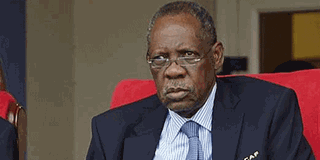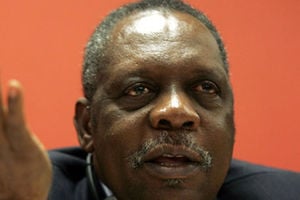
Confederation of African Football (Caf) President Issa Hayatou attends the 2017 Africa Cup of Nations Group B match between Algeria and Tunisia in Franceville on January 19, 2017.
Former African football president Issa Hayatou died on Thursday, August 8, in Paris after a long illness, one day shy of his 78th birthday.
He presided over the Confederation of African Football’s (CAF) affairs for 29 years from 1988 until his surprise ouster in 2017.
The Cameroonian also served as acting Fifa president from 2015 to 2016 after Sepp Blatter was suspended by world football’s governing body.

Confederation of African Football (CAF) president Issa Hayatou leaves his hotel on November 3, 2014, in Rabat, Morocco.
He was an International Olympic Committee member from 2001-2016, after which he became an honorary member. Hayatou even challenged Blatter for the Fifa presidency in 2002 but lost heavily.
He began his sports career as a sprinter and held Cameroon’s national record over 400 metres. He was a member of Cameroon’s basketball team and also pursued a career as a Physical Education teacher.
But by the end of his life, few could remember his impact in the classroom. He was better known on and off the pitch of football where he reigned supreme, until 2017.
On Thursday, Cameroon’s state radio announced Hayatou had died in Paris, where he had been following the Olympic Games while also nursing a long-term, undisclosed, illness. He had been frail in recent months and had been in and out of hospital for some time.
The internet ‘killed’ him long before he actually died. He had initially been forced to deny those rumours, somehow mimicking his resilience in life.
Hayatou joined the leadership of Cameroon’s football federation, Fecafoot, as Secretary General in 1985 and later as its president. He was elected CAF President in 1988 following the retirement of Ethiopia’s Ydnekatchew Tessema.
He held the position for 29 years until Madagascar’s Ahmad Ahmad deposed him. He had a chequered career in football administration. While some accused him of corruption and mismanagement in football administration, others praised him for expanding the Africa Cup of Nations (Afcon), the premier tournament of CAF member states.

A file photo taken on May 29, 2015, shows Fifa president Sepp Blatter (right) shaking hands with Fifa Executive member Issa Hayatou after being re-elected during the 65th Fifa Congress in Zurich. Hayatou on October 8, 2015, took temporary charge of Fifa after Blatter was "relieved of his duties" because of his 90-day suspension, the world body said.
Born on August 9, 1946, to an influential royal family in Garoua, north of Cameroon, Hayatou first started out as a Sports and Physical Education teacher and moved on to sports administration. In the early 1980s, he served as Director of Sports in Cameroon under the Ministry of Sport.
Like his country’s president Paul Biya of Cameroon, Hayatou became a successive election winner, clinching six subsequent mandates to stay at the helm of CAF.
In 2017, he was shockingly defeated while seeking an eighth term. Hayatou also served as Senior Vice President of Fifa for 25 years, from 1992 to 2017. He acted as Fifa president for four months, from October 2015 to February 2016.
At that time the Fifa president, Blatter, had been banned from all football-related activities while internal investigations over corruption were being carried out. Besides occasional allegations of scandal or abuse of power at CAF, Hayatou is credited with raising the profile of African football.
At the time the Cameroonian took over the continental body, the Afcon involved just eight teams and only two spots were reserved for Africa at the World Cup.
Afcon expanded to the current 24-nation affair. Under Hayatou, several competitions were introduced and expanded. He created the Women’s Under-20 and Under-17 Africa Cup of Nations and the African Nations Championships (Chan), the Afcon version of home-based players Hayatou persuaded Fifa to increase the number of slots for Africa from two to five at the World Cup and increase from one to four seats for Africa on the Fifa executive committee.
Africa was also able to host its first World Cup, in South Africa in 2010, during his term. As football in Africa rose, so too did his stature, mimicking the careers of heads of state across the continent. One incident illustrates Hayatou’s growing influence on the continent.
In November 2014, he placed a call to the President of Equatorial Guinea Obiang Nguema to request for the 2015 Afrcon to be hosted in his country after Morocco discarded their hosting rights following an Ebola outbreak in West Africa. That was barely two months to the continent’s kick-off. Hayatou jetted into the Equatoguinean capital Malabo and was received by the President.
It was on Friday, November 14, 2014. A deal would be struck for the country to host the tournament. Many Cameroonian football writers and stakeholders believe Fifa had a hand in Hayatou’s humiliating election loss to Ahmad.
Prior to the election in Addis Ababa, Philip Chiyangwa, then president of the Council of Southern African Football Associations (Cosafa) had organised a meeting with members of the association during which Ahmad was endorsed to succeed Hayatou in the presence of Fifa president, Gianni Infantino who was “invited” to the meeting as a guest.
“The strategy to bring someone from nowhere worked as Hayatou already had a grip on influential members of the CAF executive committee. A few had tried to succeed him and run into trouble,” Cameroonian football analyst, Franklin Sone Bayen argued of Hayatou fate.
Hayatou had even run for Fifa president against Blatter in 2002 but paradoxically, the Cameroon FA voted for Blatter.
It is said that Iya Mohammed, his kinsman, who was president of Fecafoot then, received instructions from the government to cast the Cameroon vote in favour of Blatter who had met President Biya in Yaounde during his campaign tour.
Yet, Hayatou played a key role in awarding the hosting rights of the 2019 tournament to Cameroon. CAF under Ahmad later moved the tournament from Cameroon to Egypt citing security challenges and delays in infrastructural developments. Critics, though, saw the decision as a score-settling on Hayatou.
Cameroon was given the 2021 Afcon, which was delayed by 12 months due to the Covid-19 pandemic. Two months after he lost the CAF top seat Hayatou, returned to Cameroon from Cairo where he had spent most of his time.
President Biya appointed Hayatou as chairperson of the Board of Directors of the National Football Academy of Cameroon. This was not surprising.
The Hayatou family has wielded much political power, having been traditional holders of the sultanate known as Lamidat. During the tenure of Cameroon’s first president, Ahmadou Ahidjo and in Biya administrations, Hayatou’s brother Sadou, served as Prime Minister and Alim Garga Hayatou, who had become the Sultan (Lamido) of Garoua, served as Secretary of State in the Cameroon Ministry of Public Health in charge of epidemics and pandemics.
Speculation that Hayatou would be given a government position peaked following the death of his brother Alim Garga in 2021. When Garoua kingmakers gathered to select a new Lamido (king), rumours filtered that the former king of African football administration was going to ascend to the throne.
However, it was his younger nephew army captain Ibrahim El Rachidine who was chosen for the royal seat. At the same time, Hayatou received another nail on his football coffin. Fifa slapped him with a one-year ban from all football-related activities for breach of the code of ethics during his tenure as CAF boss.
He was also fined $33,189. Fifa’s investigations centred on $1billion deal Hayatou signed with the French company, Lagardere Sport for the commercialisation of media and marketing rights of CAF-organised competitions while he served as president of the continental football body.
However, in February 2022, the Court of Arbitration for Sport (CAS) agreed with his appeal against the Adjudicatory Chamber of the Fifa Ethics Committee, dropping the ban.
The ban had prevented Hayatou from attending the opening ceremony of the 33rd edition of the Afcon in his homeland, in January 2022. However, the CAS decision meant he could attend the closing ceremony.
A fighter to the end.







